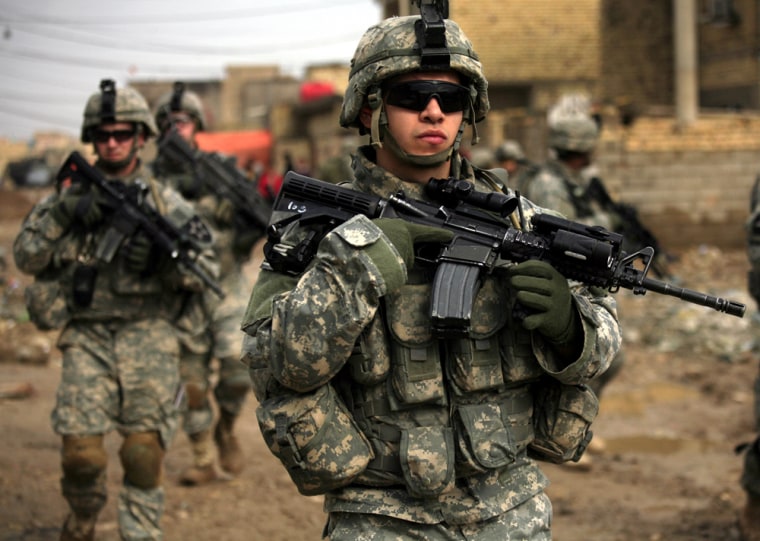As a military offensive seeks to bring Baghdad from the brink of anarchy, a top Iraqi security officer tried Friday to measure its early stages using the grim logic of a place with daily bloodshed: by counting the bodies arriving at the morgue.
A total of 10 corpses were collected off the streets — apparently all victims of the city’s lawless jumble of gang justice and sectarian payback. The daily body tally recently has often been 40 or more, excluding major bombings, said Brig. Gen. Qassim Moussawi.
This was the basis for an upbeat message by Moussawi, a spokesman for the joint U.S.-Iraqi security sweep that began this week and has so far faced limited resistance. But his American counterparts remain much more guarded.
“I would say that it is way too early to establish any trends,” said Lt. Col. Chris Garver, a U.S. military spokesman. “We’ve just started to focus our operations. We have months to go to see if we are going to succeed or not.”
Added Maj. Gen. Joseph Fil, commander of U.S. forces in Baghdad, “There’s no question about it, that many of these extremists are laying low and watching to see what it is we do and how we do it. How long that will last, we don’t know.”
The contrasting outlooks cut across the entire mission, dubbed Operation Law and Order, which seeks to reclaim the streets. Powerful militias and freelance vigilantes have carved Baghdad into fiefdoms and made even daily errands a gamble that could end with a car bombing or gunfire.
'At the beginning stages'
The Iraqis are eager to show clear progress to boost the leadership of Prime Minister Nouri al-Maliki. U.S. commanders, however, are approaching the neighbor-by-neighbor sweep as a methodical campaign without quick victories — learning from past mistakes of pouring through an area, only to find that militiamen simply went underground and returned after American forces left.
“We are just at the beginning stages,” reminded Garver.
But evidence of the offensive against militants appeared around the country.
Borders to Iran and Syria have been temporarily sealed in attempts to foil suspected supply routes. In Diyala province northeast of Baghdad, U.S. forces are under sharply escalating attacks from Sunni Muslim insurgents — suggesting that some groups have shifted from Baghdad to other areas to sidestep the crackdown in the capital.
U.S. military officials said demolition experts destroyed a bomb-making factory they linked to the al-Qaida in Iraq faction in Salman Pak, just southwest of Baghdad. The statement said the workshop contained about 1,000 pounds of explosives.
But doubt was cast on another reported blow to al-Qaida in Iraq.
The Interior Ministry said that leader Abu Hamza al-Muhajir, also known as Abu Ayyub al-Masri, was wounded and an aide killed Thursday in a clash with Iraqi forces near Balad, north of Baghdad.
Garver, the U.S. military spokesman, later said the Pentagon had no information that al-Masri was hit.
More cult arrests reported
Iraqi security officials also said 34 armed men belonging to a messianic Shiite cult were detained near Hillah, about 60 miles south of Baghdad.
The Soldiers of Heaven, or Jund al-Samaa, cult was involved in a fierce gunbattle last month with Iraqi forces who accused it of planning to kill Shiite clerics and others in a bid to force the return of the “Hidden Imam” — a descendant of the Prophet Muhammad who disappeared as a child in the 9th century. Shiites believe he will return one day to bring justice.
In mosques Friday, some Muslim clerics supported the general goals of the military push to calm Baghdad. But others used the weekly prayers to denounce the American troop buildup in Baghdad.
Political leaders, too, quarreled over the widening security sweeps — reflecting starkly opposing perspectives among Iraq’s two Muslim groups.
The majority Shiites have generally favored the campaign as a way to neutralize Sunni militant groups, blamed for waves of recent car bombings. Sunnis — who enjoyed a privileged position under Saddam Hussein — believe Shiite factions will use the military push to try to cement controls of key areas in Baghdad.
Sunni lawmaker Dhafir Al-Ani said on Al-Arabiya television that the Baghdad security plan had lost the “element of surprise” because it was announced long in advance, giving Shiite militiamen time to flee to Iran. He also claimed Shiite militias had provided security forces with some of the names on their wanted list.
But a Shiite lawmaker, Hadi Al-Amiri, backed the U.S.-Iraqi crackdown as a way to “target all those who cause the Iraqi bloodshed.”
In other developments:
- The Pentagon said it is sending an Army division headquarters staff of about 1,000 soldiers to Baghdad three months ahead of schedule, a move intended to improve the Army’s ability to command and control the thousands of extra combat troops that President Bush has ordered to Iraq.
- Iraq’s Sunni vice president, Tariq al-Hashemi, told the Arabic language daily Al-Hayat that Sunni insurgents who are “honorable and genuine” must be given the chance to join the political process now that the United States is eager to pull its troops from Iraq. He said U.S. and Iraqi representatives must negotiate “with the participation of the resistance” after “America has failed to run the country.”
